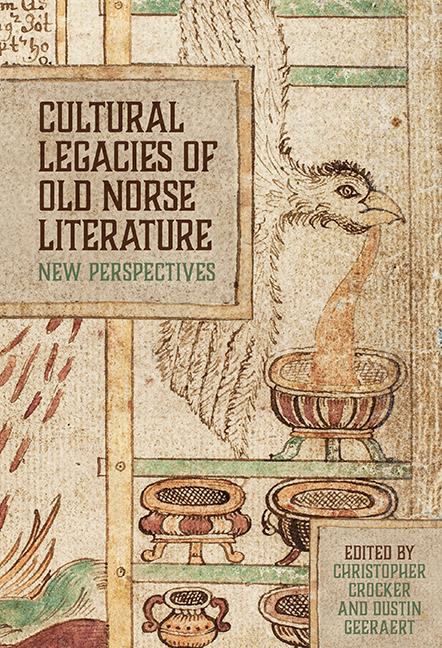Book contents
- Frontmatter
- Contents
- List of Illustrations
- List of Contributors
- Foreword: Old Norse and the Porous Boundaries of Medievalism
- Acknowledgements
- Note on the Text
- Introduction
- 1 Dr Jekyll and Mr Hyde in Medieval Iceland: Saga Realism and the Sworn Brothers
- 2 The Malleability of the Past: Íslendingabók as Narrative History
- 3 Women’s Work and Material Culture in Medieval Iceland: Gender, Narrative, and Cloth Production
- 4 Vafþrúðnismál, from Parchment to Print: Stability and Change in the Transmission of Eddic Poetry
- 5 The Odinic Motif: The Wanderer in the Mist
- 6 What has Darwin to do with Óðinn? Shapeshifting, God, and Nature in the ‘Great Story of the North’
- 7 Madness, Mythology, and Mitteleuropa: Günter Grass’s Transformation of Old Norse Myth in The Tin Drum
- 8 Once More, with Fiction: Transforming Myth in Gerður Kristný’s Blóðhófnir and the Eddic Poem Skírnismál
- Afterword: Ethnographic Medievalisms
- Bibliography
- Index
1 - Dr Jekyll and Mr Hyde in Medieval Iceland: Saga Realism and the Sworn Brothers
Published online by Cambridge University Press: 08 October 2022
- Frontmatter
- Contents
- List of Illustrations
- List of Contributors
- Foreword: Old Norse and the Porous Boundaries of Medievalism
- Acknowledgements
- Note on the Text
- Introduction
- 1 Dr Jekyll and Mr Hyde in Medieval Iceland: Saga Realism and the Sworn Brothers
- 2 The Malleability of the Past: Íslendingabók as Narrative History
- 3 Women’s Work and Material Culture in Medieval Iceland: Gender, Narrative, and Cloth Production
- 4 Vafþrúðnismál, from Parchment to Print: Stability and Change in the Transmission of Eddic Poetry
- 5 The Odinic Motif: The Wanderer in the Mist
- 6 What has Darwin to do with Óðinn? Shapeshifting, God, and Nature in the ‘Great Story of the North’
- 7 Madness, Mythology, and Mitteleuropa: Günter Grass’s Transformation of Old Norse Myth in The Tin Drum
- 8 Once More, with Fiction: Transforming Myth in Gerður Kristný’s Blóðhófnir and the Eddic Poem Skírnismál
- Afterword: Ethnographic Medievalisms
- Bibliography
- Index
Summary
The history of the reception of the Sagas of Icelanders is lengthy and complex, ever since their emergence as written texts in the thirteenth century. Whereas most of the sagas are earliest attested in fourteenth-century manuscripts and a handful only in fifteenth-century or post-medieval manuscripts, Sigurður Nordal (1886–1974) grouped the sagas into five evolutionary stages, dating the earliest sagas to about 1200 and the youngest to the latter half of the fourteenth century. In this system, most of the best-known or ‘classical sagas’ were composed in the thirteenth century. Sigurður Nordal proposed a development from clumsy and ‘historical’ sagas to the true works of art, followed by a degeneration into completely fictional sagas that were exaggerated and colourless. However, no accounts exist that shed much light on the original audience reactions to these narratives and very little can be discerned from the texts themselves about the probable initial audience reception of the sagas. It is, however, still necessary for the critic to keep the saga audience constantly in mind – like all texts, the sagas are intended to communicate something to someone for some reason.
This study takes as its starting point the late nineteenth- and early twentieth-century scholarly and popular reactions to the medieval Icelandic Fóstbræðra saga and juxtaposes them with a different interpretation that may shed light on the meaning of the text both to a modern and a medieval audience, although this meaning may be far from overt in the minds of either group. Any discussion of meaning must necessarily be concerned with the potential of a text to mean, as the actual meaning of a text to an actual reader or listener is not easy to locate. The meaning of any text is the product of an uneasy contract between its author and audience and thus it is important to work from the premise that a new audience must in some way create a new meaning of the text. Such potential interpretations are the focus of the present study.
Fóstbroeðra saga is the narrative of two sworn brothers with seemingly opposite personalities; Þorgeirr Hávarsson is a brave and merciless warrior who kills people for entertainment, whereas Þormóðr Kolbrúnarskáld is a mischievous womaniser and poet.
- Type
- Chapter
- Information
- Cultural Legacies of Old Norse LiteratureNew Perspectives, pp. 8 - 24Publisher: Boydell & BrewerPrint publication year: 2022



